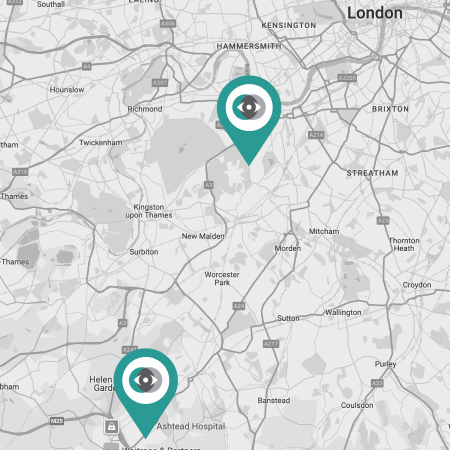
Can computer screens cause cataracts?
In today’s world, many of us spend hours each day looking at screens, computers, phones, tablets, and TVs. If your eyes often feel tired or blurry after screen time, you might wonder whether all that staring could cause long-term problems like cataracts.
So, can computer screens cause cataracts? The short answer is no, but they can make your eyes feel uncomfortable or strained. In this post, we’ll explain what cataracts are, how screen time affects your eyes, and what you can do to keep them healthy. We’ll also share expert insights from Professor Paul Ursell, a leading cataract surgeon in Surrey, England.
What are cataracts?
A cataract is when the clear lens inside your eye becomes cloudy. This cloudiness makes your vision blurry or hazy and can make colours look faded or yellowed.
Cataracts develop slowly over time, most often due to ageing. They’re one of the most common eye conditions in older adults and can affect one or both eyes.
Common signs of cataracts include:
- Blurry or misty vision
- Sensitivity to bright lights or glare
- Faded or yellowed colours
- Needing more light to read
- Frequent changes in your glasses prescription
If cataracts become severe, they can make everyday activities, like reading, driving, or recognising faces — difficult. The only effective treatment is cataract surgery, where the cloudy lens is replaced with a clear artificial one.
Professor Paul Ursell, an experienced eye surgeon based in Surrey, performs this procedure regularly to help patients see clearly again.
What causes cataracts?
Cataracts form when the proteins in the lens of your eye clump together over time. This process is a natural part of ageing, but other factors can make it happen sooner.
Common causes include:
- Ageing (the biggest risk factor)
- Too much exposure to sunlight (UV rays)
- Smoking
- Diabetes
- Eye injuries or previous eye surgery
- Certain medications, such as long-term steroid use
- Family history of cataracts
So, while screen time may make your eyes feel tired, it doesn’t directly cause cataracts.
Do computer screens cause cataracts?
No, computer screens do not cause cataracts. There’s no scientific evidence showing that looking at a screen can make your lens cloudy or increase your risk of cataracts.
Cataracts are caused by physical changes inside your eye’s lens, not by light from screens. However, long hours of screen use can cause eye strain, sometimes called digital eye strain or computer vision syndrome.
This can make your eyes feel dry, tired, or sore, but it doesn’t cause permanent damage.
What is digital eye strain?
Digital eye strain happens when your eyes get tired from focusing on screens for too long. Our eyes have to work harder when looking at screens because:
- We blink less often when concentrating
- The lighting and glare from screens can make focusing harder
- Small text and bright colours force the eyes to adjust constantly
Common symptoms of digital eye strain include:
- Dry, itchy, or watery eyes
- Blurry vision
- Headaches
- Neck or shoulder pain
- Trouble focusing after looking away from the screen
These symptoms can be uncomfortable, but they usually go away with rest or changes in screen habits.
What about blue light from screens?
Many people worry about the blue light that comes from phones, tablets, and computers. Some believe it might damage the eyes or cause cataracts.
However, studies have shown that the amount of blue light from screens is far too small to harm your eyes or cause cataracts. The sun gives off much more blue light than any device.
That said, blue light can make it harder to fall asleep if you use screens late at night, and it may add to digital eye strain for some people.
If your eyes feel tired, you can:
- Use “night mode” or “blue light filter” on your screen
- Reduce screen brightness
- Keep screens slightly below eye level and about an arm’s length away
These simple changes can help reduce discomfort.
How can I protect my eyes when using screens?
Even though screens don’t cause cataracts, it’s still important to care for your eyes, especially if you spend hours at a computer for work or study.
Here are a few tips:
- Follow the 20-20-20 rule
Every 20 minutes, look at something 20 feet away for at least 20 seconds. This gives your eyes a chance to relax. - Blink often
Remember to blink regularly to keep your eyes moist. You can also use artificial tears if your eyes feel dry. - Adjust your lighting
Avoid sitting in front of bright windows or under harsh lights. Reduce glare on your screen by adjusting its angle or using a matte filter. - Keep your screen clean and at the right distance
A clean screen helps reduce glare and strain. Keep it about an arm’s length away and slightly below eye level. - Have regular eye exams
Seeing an eye specialist every 1–2 years helps catch any changes early, whether they’re from cataracts, glaucoma, or other eye conditions.
If you’re over 60, regular eye checks are especially important, as cataracts can develop slowly without you noticing.
Can screen time make cataracts worse?
If you already have cataracts, screen time won’t make them worse or faster-growing. But, the glare from a bright screen might make your cloudy vision more noticeable.
You might find that reading on a computer or phone becomes more difficult, especially in bright light. If that’s the case, lowering screen brightness or using larger text can help.
If cataracts are making it hard to see clearly, it may be time to discuss treatment options. Professor Paul Ursell can assess your vision and help you decide if cataract surgery could restore your sight.
Cataract surgery: A simple and safe solution
Cataract surgery is a safe and quick procedure that can greatly improve your vision. During the operation, Professor Paul Ursell removes the cloudy lens and replaces it with a clear artificial one.
The surgery usually takes less than 30 minutes and is done under local anaesthetic, meaning you’ll be awake but won’t feel pain. Most people go home the same day and notice better vision within days.
After surgery, many patients are amazed at how bright and colourful everything looks again.
Final thoughts
Computer screens don’t cause cataracts, but they can make your eyes feel tired, sore, or strained after long use. Cataracts, on the other hand, develop naturally over time and are caused by ageing or other health factors.
The best way to protect your eyes is to take regular breaks from screens, wear UV-protective sunglasses outdoors, and have your eyes checked regularly.
If you’re struggling with cloudy or blurry vision, Professor Paul Ursell in Surrey can help you understand your cataract treatment options and restore your clear sight.
Take the suitability self-test today and find out how you can start seeing life more clearly again.
Are you suitable for vision correction surgery?
It isn’t suitable for everyone.
The first step is to book an assessment so you can find out whether you can benefit.
Our most popular procedures
What our patients say…
★ ★ ★ ★ ★“Excellent result. Complete confidence in Paul Ursell. Quiet, quick, and efficient. Peaceful and comfortable hospital.”
★ ★ ★ ★ ★
“The cataract surgery on both of my eyes went very smoothly without any problems. There was no pain afterwards and I didn’t have to wear any eyepatch. I would highly recommend Professor Ursell for cataract surgery.”
★ ★ ★ ★ ★“Highly professional, extremely efficient, and an excellent communicator, Paul exudes experience, knowledge, and ability. The whole process — initial consultation, operation, and post-op check-up — was wonderfully stress-free. I now have 20/20 vision, am glasses-free, and I am delighted by the results.”
★ ★ ★ ★ ★
“The cataract surgery has completely changed my life. Mr. Ursell put me at ease and explained all options. The procedure was quick and painless and completely successful, and I now have 20/20 vision in my good eye. One of the reasons I had the surgery was because of Mr. Ursell’s standing and experience. Cannot praise highly enough.”
★ ★ ★ ★ ★
“I was very short-sighted and my cataracts badly affected both reading and distance acuity. After the operation I now have very good distance vision (glasses-free) but still need glasses for reading. (This was the expected outcome as I did not want multi-focus implants). The operation was quick and painless, and I had no post-operative discomfort at all (which surprised me). The results are remarkable.
I can certainly recommend Professor Ursell. He is a personable consultant and a skilled surgeon.”
★ ★ ★ ★ ★
“Dr. Paul Ursell squashed many of my concerns for not having cataract surgery. He offered comfort with examples of his long/distinguished career and new technology that he applies to the surgery.
Both before and after the surgery, Dr. Ursell and staff gave me the information and attention I needed. It was a great success, and I highly recommend Dr. Ursell.”
We have replaced the images of real patients who provided these testimonials to protect their privacy.








